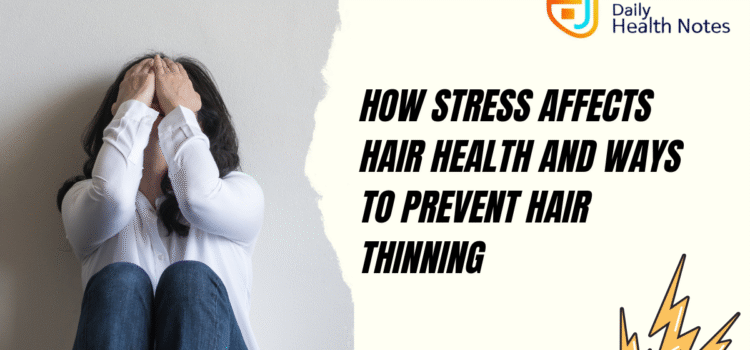
How Stress Affects Hair Health and Ways to Prevent Hair Thinning
Introduction: Can Stress Be the Hidden Cause of Your Hair Thinning?
Stress is an inevitable part of life, but when it becomes chronic, it can have a surprising and sometimes alarming effect on your body—particularly your hair. If you’ve noticed increased hair shedding, thinning, or even bald patches, stress might be the culprit.Many people aren’t aware that mental and emotional stress can trigger hair loss, leaving them frustrated and unsure about how to combat it. Whether it’s work, family, or financial pressures, the impact stress has on hair health is significant and often misunderstood. In this article, we’ll explore how stress affects hair health and provide actionable tips on how to prevent hair thinning.The Science Behind Stress and Hair Loss
When you’re stressed, your body produces higher levels of the hormone cortisol. This hormone, while essential for managing short-term stress, can wreak havoc on your body if it’s constantly elevated. The hair growth cycle is particularly vulnerable to these fluctuations in cortisol levels.
Telogen Effluvium: The Stress-Induced Hair Loss
One of the most common forms of hair loss triggered by stress is telogen effluvium. This condition occurs when a significant number of hair follicles enter the resting phase (telogen) prematurely, causing them to shed after about two to three months. Stress doesn’t cause hair loss overnight; rather, the effects become noticeable weeks after the stressful event.
Other forms of stress-related hair loss include:
- Alopecia Areata: An autoimmune disorder where the immune system attacks hair follicles, often triggered by stress.
- Trichotillomania: A compulsive hair-pulling disorder, often exacerbated by stress or anxiety.
How Stress Affects the Hair Growth Cycle
Your hair goes through three main phases:
- Anagen (growth phase)
- Catagen (transitional phase)
- Telogen (resting phase)
Stress can cause more follicles to transition into the telogen phase, which disrupts the natural growth cycle, leading to noticeable hair shedding.
How to Prevent Hair Thinning and Promote Healthy Hair
While stress may not always be avoidable, there are steps you can take to minimize its impact on your hair health. Here are some expert-approved tips to help manage stress-related hair thinning:
1. Manage Stress with Mindfulness and Relaxation Techniques
Learning to manage stress is essential for both your overall health and your hair. Practicing mindfulness through meditation, yoga, or deep breathing exercises can significantly reduce cortisol levels. Here are a few stress-relief methods:
- Yoga and Stretching: A great way to relieve tension and improve blood circulation to the scalp.
- Meditation: Regular mindfulness meditation helps calm the nervous system and lower stress.
- Breathing Exercises: Simple breathing exercises can quickly reduce anxiety and stress levels.
Incorporating these practices into your daily routine can not only improve your mental well-being but also prevent stress from harming your hair health.
2. Get Enough Sleep
Quality sleep is vital for overall health and for managing stress. When you don’t get enough rest, cortisol levels rise, which can directly impact your hair’s health. Adults should aim for 7-9 hours of sleep each night to allow your body to regenerate and repair.
- Pro Tip: Establish a consistent sleep routine by going to bed and waking up at the same time each day.
3. Maintain a Balanced Diet
A well-rounded diet rich in vitamins, minerals, and antioxidants is key to promoting healthy hair growth. Vitamin D, B-vitamins, and zinc are especially important for hair health and can help combat the effects of stress on your scalp.
- Foods to Include:
- Leafy greens for vitamins A and C
- Fatty fish like salmon for omega-3s and vitamin D
- Eggs, nuts, and seeds for protein and biotin
- Avocados for healthy fats
Eating a nutritious, balanced diet supports the production of hair follicles and can help maintain thick, strong hair.
4. Hair Care Routine: Be Gentle and Avoid Heat Styling
Stress can make your hair more vulnerable, so being gentle with your hair care routine is essential. Use mild shampoos and conditioners that nourish and hydrate your hair without stripping away essential oils. Avoid washing your hair with hot water, as it can dry out the scalp and hair, making it more prone to breakage.
- Pro Tip: Limit the use of heat styling tools like flat irons and curling irons, as excessive heat can lead to further damage and thinning.
5. Consult a Dermatologist or Trichologist
If you’re experiencing significant hair thinning or hair loss, it’s crucial to consult a dermatologist or a trichologist (a hair and scalp specialist). These professionals can assess the cause of your hair loss and suggest treatments or medications that can help restore hair growth. Common treatments for stress-related hair thinning include:
- Topical treatments like minoxidil (Rogaine)
- Platelet-rich plasma (PRP) therapy
- Laser therapy for hair regrowth
In some cases, a healthcare provider may recommend blood tests to check for nutritional deficiencies or underlying health conditions contributing to hair thinning.
U.S. Hair Health Trends and Statistics
In the U.S., stress-related hair loss is an increasing concern, particularly with the rising levels of stress due to work, finances, and social pressures. According to the American Academy of Dermatology, approximately 50 million men and 30 million women in the United States suffer from some form of hair loss, with a significant number of cases being attributed to stress and hormonal imbalances.
Furthermore, studies show that more people are turning to natural hair care solutions and stress-reduction techniques. The growing interest in wellness and self-care trends in the U.S. reflects a shift towards holistic methods to combat hair thinning.
Take Charge of Your Hair Health
Stress is a powerful force that can directly impact your hair health, leading to thinning and shedding. However, by taking steps to manage your stress, improve your diet, and establish a healthy hair care routine, you can protect your locks from the negative effects of stress.
If you’re struggling with hair thinning or hair loss, remember that you’re not alone, and solutions are available. Take control of your hair health by incorporating stress management techniques and healthy lifestyle choices into your routine.












